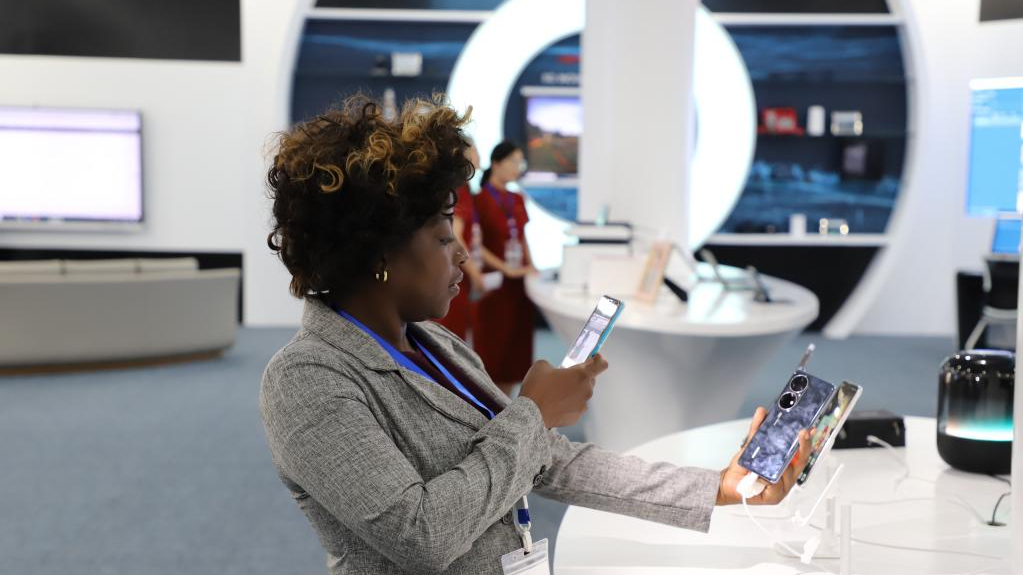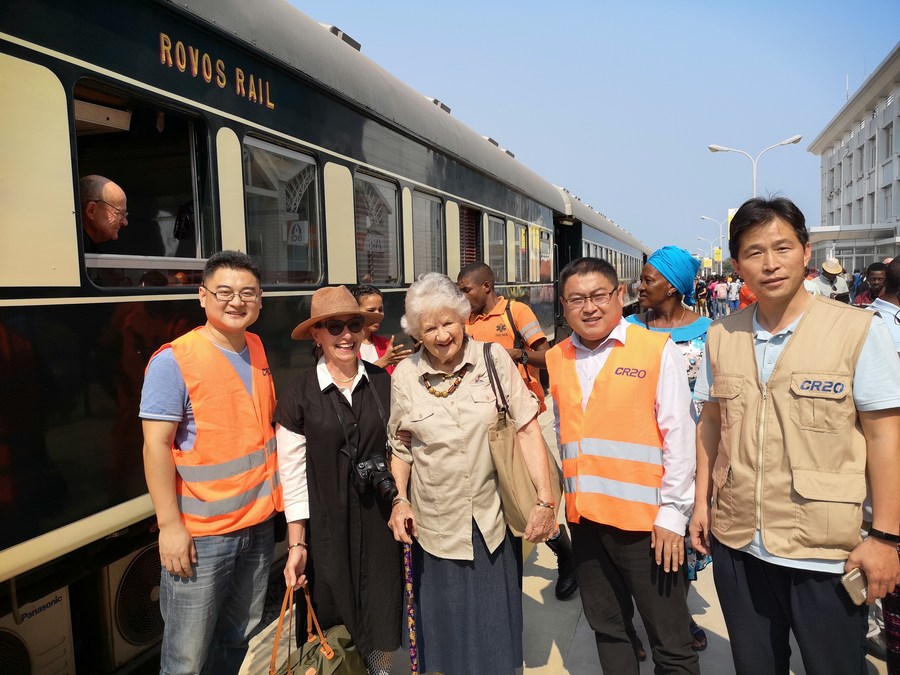
A visitor takes photos of a mobile phone displayed at the inauguration ceremony of Huawei's technology park, in Luanda, Angola, November 14, 2022. /Xinhua
A visitor takes photos of a mobile phone displayed at the inauguration ceremony of Huawei's technology park, in Luanda, Angola, November 14, 2022. /Xinhua
Editor's note: March 2023 marks the 10th anniversary when the concept of "Community with a Shared Future for Mankind" was first introduced by China. To commemorate this occasion, CGTN is working with the Institute for a Community with Shared Future from Communication University of China, to invite researchers specialized in the field from around the world to contribute their visions. Pedro Txai Leal Brancher is the Dean of the Angola Center for a Community with a Shared Future, and the Chair of the International Relations Department at the Methodist University of Angola. The article reflects the author's opinions, and not necessarily the views of CGTN.
On March 23, Chinese President Xi Jinping's grand vision of a community with a shared future for mankind completes its 10th anniversary. The concept envisions a secure, democratic, and prosperous international system, and has guided China's engagement with the international community.
Regarding the Global South, the Chinese ethos emphasizes win-win cooperation, knowledge sharing, non-interference in internal affairs, and long-term partnerships. The deepening of China-Angola relations in the last few years has shown practical benefits for all Africans.
After the end of the Angolan Civil War in 2002, the nation's access to global financial markets was constrained. At that time, the Beijing and Luanda partnership had become more critical for rebuilding Angola's national infrastructure. Without requiring political conditions, Chinese-Angolan cooperation has ensured the allocation of funds to expand and renovate roads, hospitals, households, schools, transportation, and public facilities. The construction of the Kilamba Kiaxi neighborhood, Kuito Airport, Luanda's General Hospital, as well as a deep-water harbor and a water supply project in the Cabinda province have demonstrated the positive impacts produced by Chinese companies on the Angolans' quality of life.

Staff of China Railway 20 Bureau who constructed the Benguela Railway pose for a group photo with visitors from Rovos Rail, in Lobito, Angola, July 30, 2019. /Xinhua
Staff of China Railway 20 Bureau who constructed the Benguela Railway pose for a group photo with visitors from Rovos Rail, in Lobito, Angola, July 30, 2019. /Xinhua
China sees Angola as an essential regional actor in Southern Africa and deserving a stronger voice in the multipolar world order. Diplomatically, their relations are embedded in permanent bilateral dialogues and a dense multilateral institutions framework, such as the Forum on China-Africa Cooperation, the Forum for Economic and Trade Co-operation between China and Portuguese-Speaking Countries, as well as the China-Africa Cooperation Forum.
The Sino-Angolan convergence was exemplified by the meeting between Angolan President Joao Lourenco and Chinese Foreign Minister Qin Gang held in Luanda on January 14. On the occasion, while the Angolan leader manifested his country's commitment to the one-China principle, the Chinese diplomat displayed Beijing's appreciation for Angola's role as a mediator in the current political tensions between the Democratic Republic of the Congo and Rwanda.
Sino-Angolan economic relations have also expanded beyond the oil and infrastructure sectors, reaching cooperation in digital technologies, human capital, finance, real estate, agriculture, and industry. In 2022, Chinese company Huawei inaugurated a technology park covering 32,000 square meters in Luanda. Angola's Minister of Telecommunications, Information Technology and Social Communication Mario Oliveira, and Huawei representative signed a Memorandum of Understanding (MoU) regarding training more than 1,500 young Angolans in Information and Communication Technology.
The strategic partnership between China and Angola has gained momentum. On January 12, the Chinese embassy in Luanda held a commemorative reception to celebrate the 40th anniversary of bilateral relations, which was attended by around 600 people, including political officials, military personnel, business people, and members of Angolan civil society.
One day earlier, Angolan Minister of Finance Vera Daves de Souza and Chinese Ambassador Gong Tao signed a $249 million agreement for a 2,000-kilometer fiber optic cable network and installation of a submarine connection with the Cabinda enclave.
By 2022, only 36 percent of Angolans were using the Internet, a percentage much lower than that of other African countries such as Namibia, Botswana, and South Africa. Therefore, the agreement is a sound breakthrough in Angola's goal to become embedded in the digital economy.
Besides official contacts, the Chinese community in Angola supports boosting economic and social development with Angolans. The Cidade da China, a neighborhood on Luanda's outskirts where many Chinese stores are clustered, has become a vital business center and tourist attraction in Angola's capital. By 2022, nearly 20,000 Chinese were living in Angola.
Meanwhile, there's still enormous untapped potential in Chinese-Angolan relations. Successful Chinese policies for rural revitalization and poverty reduction based on digital technologies may provide insights into Angolan public policymaking in these areas. Increasing scientific interactions and knowledge sharing between the two academic communities is crucial.
(If you want to contribute and have specific expertise, please contact us at opinions@cgtn.com. Follow @thouse_opinions on Twitter to discover the latest commentaries in the CGTN Opinion Section.)